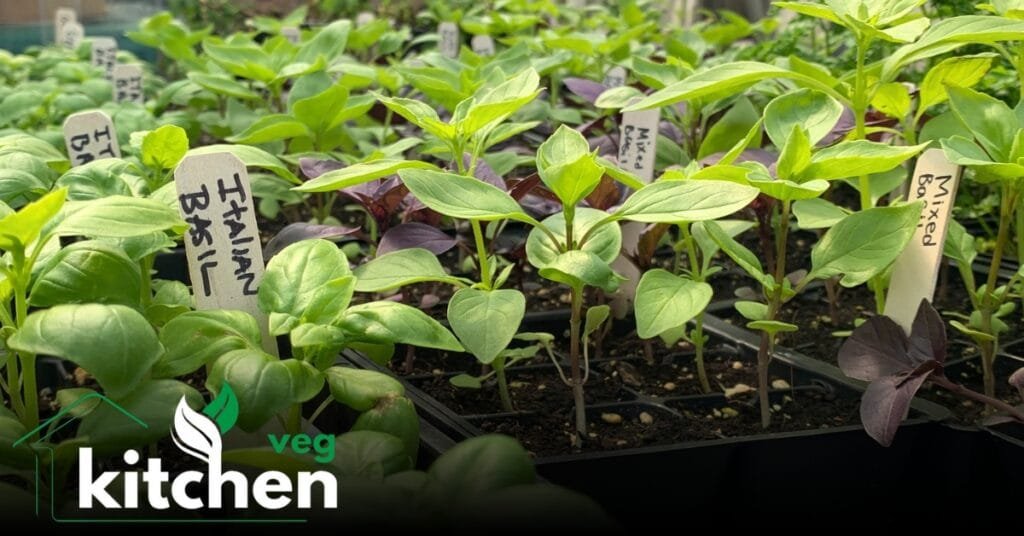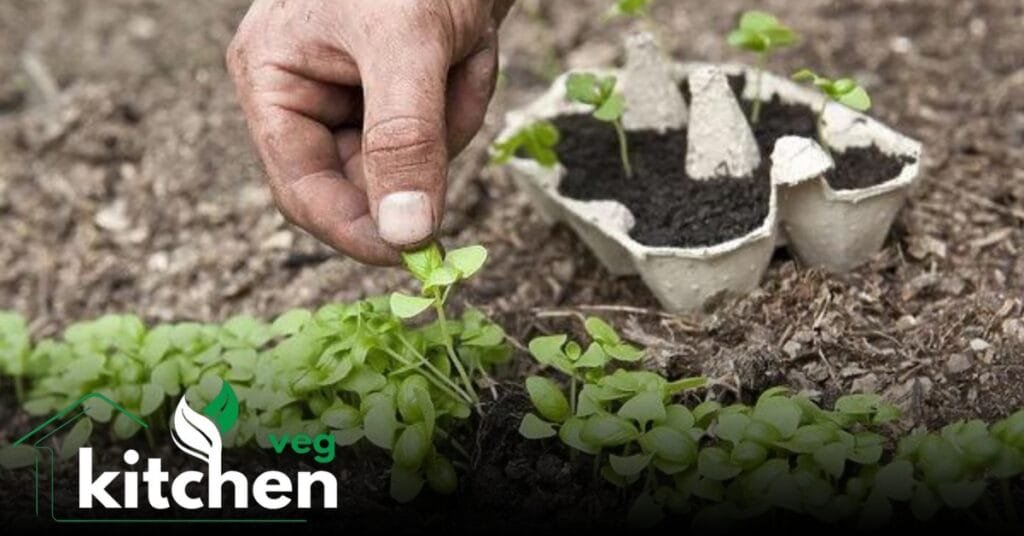Introduction:
Basil sprouts are the young, tender shoots of the basil plant, harvested shortly after germination. Unlike mature basil leaves, these sprouts offer a milder flavor and a delicate texture. They are typically used in salads, sandwiches, and as a garnish. Rich in vitamins and minerals, basil sprouts provide a nutritional boost to any meal. For a variety of greens, consider adding arugula to your dishes as well.
The Nutritional Value of Basil Sprouts:
Basil sprouts are packed with nutrients, making them a healthy addition to your diet. They contain vitamins A, C, and K, which support immune function, skin health, and blood clotting, respectively.
Additionally, they are rich in antioxidants, which help combat oxidative stress and reduce inflammation. Basil-sprouts also provide essential minerals such as calcium, magnesium, and iron, contributing to overall well-being.
Vitamins and Antioxidants:
The vitamins in basil-sprouts play crucial roles in maintaining health. Vitamin A is essential for vision and immune function, while vitamin C supports skin health and aids in wound healing.
Vitamin K is necessary for proper blood clotting and bone health. The antioxidants in basil sprouts, including flavonoids and polyphenols, help protect cells from damage caused by free radicals.
Minerals:
Basil-sprouts are a good source of calcium, which is vital for bone health, and magnesium, which supports muscle and nerve function. Iron is crucial for oxygen transport in the blood and energy production. Incorporating basil-sprouts into your diet can help ensure you get these essential nutrients.
Growing Basil Sprouts: A Step-by-Step Guide:
Growing basil-sprouts is a simple and rewarding process that can be done indoors or outdoors. Here’s a step-by-step guide to help you get started:
Gather Supplies:
You will need basil seeds, a shallow container or seed tray, potting soil, water, and a sunny location or grow light.
Prepare the Container:
Fill the container with potting soil, leaving about an inch of space at the top. Moisten the soil with water, ensuring it is evenly damp but not waterlogged.
Sow the Seeds:
Sprinkle the basil seeds evenly over the soil surface. Lightly press them into the soil, but do not bury them deeply, as they need light to germinate.
Water and Cover:
Gently water the seeds to settle them into the soil. Cover the container with a clear plastic lid or plastic wrap to create a humid environment, which aids germination.
Provide Light and Warmth:
Place the container in a sunny location or under a grow light. Basil seeds require warmth (70-75°F) and light to germinate, so ensure they receive adequate light for at least 12-16 hours a day.
Monitor and Maintain:
Check the soil daily to ensure it remains moist. Remove the cover once the seeds germinate, usually within 7-14 days. Continue to provide adequate light and water as needed.
Harvest:
Basil sprouts can be harvested once they reach 1-2 inches in height, usually around 2-3 weeks after germination. Use scissors to cut the sprouts just above the soil line.
The Benefits of Growing Your Own Basil Sprouts:
Growing your own basil-sprouts offers numerous benefits, including freshness, cost savings, and the satisfaction of cultivating your own food. Homegrown sprouts are often more flavorful and nutritious than store-bought varieties, as they can be harvested at their peak.
Freshness and Flavor:
Homegrown basil-sprouts are fresher than store-bought ones, which may have been harvested days before reaching the consumer. Fresh sprouts retain their flavor and nutritional value better, enhancing your culinary creations.

Cost Savings:
Growing basil-sprouts at your garden can save money, especially if you regularly purchase them. A packet of basil seeds is inexpensive and can yield multiple batches of sprouts, providing ongoing savings.
Satisfaction and Sustainability:
Cultivating your own basil-sprouts offers a sense of accomplishment and connection to your food. It also promotes sustainability by reducing the need for packaging and transportation associated with store-bought sprouts.
Culinary Uses of Basil Sprouts:
Basil sprouts can be used in a variety of dishes, adding a fresh, mild basil flavor and a crunchy texture. Here are some popular ways to incorporate basil-sprouts into your meals:
Salads:
Basil sprouts make a delightful addition to salads, providing a burst of flavor and a nutritional boost. Combine them with other greens, vegetables, and a light vinaigrette for a refreshing and healthy salad.
Sandwiches and Wraps:
Add basil-sprouts to sandwiches and wraps for extra flavor and crunch. They pair well with a variety of fillings, including turkey, chicken, avocado, and cheese.
Garnishes:
Use basil-sprouts as a garnish for soups, pasta dishes, and pizzas. Their delicate appearance and fresh taste enhance the presentation and flavor of many dishes.
Smoothies and Juices:
Blend basil-sprouts into smoothies and juices for a unique flavor and added nutrition. They pair well with fruits like strawberries, mangoes, and bananas.
The History and Origin of Basil Sprouts:
Basil has a rich history, dating back thousands of years. Originating in India, it has been cultivated for its culinary and medicinal properties. While mature basil leaves are well-known, the use of basil-sprouts is a more recent development in culinary traditions.
Ancient Uses of Basil:
In ancient India, basil was revered for its medicinal properties and was often used in Ayurvedic medicine. It was believed to have healing properties and was used to treat various ailments.
Modern Culinary Trends:
The use of basil-sprouts in modern cuisine has grown in popularity due to their unique flavor and nutritional benefits. Chefs and home cooks alike have embraced these tender shoots, incorporating them into a variety of dishes.
HealthBenefits of Basil Sprouts:
Basil-sprouts offer several health benefits, including antioxidant properties, anti-inflammatory effects, and support for immune function. Incorporating them into your diet can contribute to overall health and well-being.
Antioxidant Properties:
The antioxidants in basil-sprouts help protect cells from damage caused by free radicals. This can reduce the risk of chronic diseases and promote healthy aging.
Anti-Inflammatory Effects:
Basil sprouts contain compounds that have anti-inflammatory properties. These can help reduce inflammation in the body, which is linked to various health conditions.
Immune Support:
The vitamins and minerals in basil-sprouts support immune function, helping the body fight off infections and illnesses. Vitamin C, in particular, plays a crucial role in maintaining a healthy immune system.
Tips for Successful Basil Sprout Cultivation:
To ensure a successful harvest of basil-sprouts, consider the following tips:
Optimal Growing Conditions:
Basil-sprouts thrive in warm, sunny conditions. Ensure they receive adequate light and maintain a consistent temperature between 70-75°F for optimal growth.
Soil and Watering:
Use high-quality potting soil and keep it consistently moist. Avoid overwatering, as this can lead to mold and root rot. Ensure proper drainage to prevent waterlogged soil.
Regular Harvesting:
Harvest basil-sprouts regularly to encourage new growth. This also prevents the sprouts from becoming too tall and leggy, ensuring a steady supply of fresh sprouts.
Common Challenges and Solutions in Growing Basil Sprouts:
Growing basil-sprouts can come with challenges, but many common issues can be addressed with proper care and attention.

Mold and Fungal Issues:
Mold and fungal issues can occur if the soil is too wet or there is poor air circulation. To prevent this, avoid overwatering and ensure proper ventilation. If mold appears, remove the affected sprouts and adjust watering practices.
Poor Germination:
If seeds fail to germinate, it could be due to insufficient light, incorrect temperature, or poor seed quality. Ensure seeds are fresh and provide adequate light and warmth for germination.
Pests:
Pests such as aphids and spider mites can affect basil-sprouts. To manage pests, inspect plants regularly and use natural pest control methods, such as neem oil or insecticidal soap, if needed.
Storing and Preserving Basil Sprouts:
Proper storage of basil sprouts ensures they remain fresh and retain their nutritional value. Here are some tips for storing and preserving basil sprouts:
Short-Term Storage:
Store basil sprouts in the refrigerator, wrapped in a damp paper towel and placed in a plastic bag. This helps maintain their moisture and freshness for up to a week.
Freezing:
Basil-sprouts can be frozen for longer storage. Blanch them briefly in boiling water, then transfer to an ice bath. Drain and pat dry before placing them in a freezer-safe bag or container. Frozen basil sprouts can be used in cooked dishes, though they may lose some texture.
Drying:
Drying basil-sprouts is another preservation method. Spread them in a single layer on a baking sheet and dry in an oven set to the lowest temperature or in a dehydrator. Store dried sprouts in an airtight container in a cool, dark place.
Conclusion: The Joy of Basil Sprouts:
Basil-sprouts are a versatile and nutritious addition to any kitchen. Growing them at garden is a rewarding experience that offers numerous benefits, from fresh flavor to cost savings.
Whether you’re a seasoned gardener or a novice, cultivating basil-sprouts is a simple and enjoyable process. With their myriad of culinary uses and health benefits, basil-sprouts are sure to become a favorite in your home.





[…] The early shoots of the carrot (Daucus carota) plant that appear soon after germination are known as carrot sprouts. Carrot sprouts are frequently disregarded despite mature carrots being well-known for their vibrant orange color and delicious flavor. Concentrated nutrient content and great flavor characterize these sprouts, usually harvested 7–14 days after germination. For more information on similar sprouts, check out our article on Basil Sprouts. […]